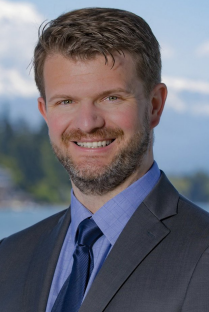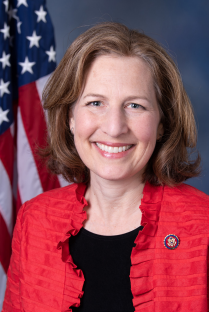The battle for the 8th district
October 27, 2020
With just a week left until election day 2020, candidates for Washington’s 8th congressional district are making their final pitches to voters.
Incumbent Rep. Kim Schrier (D-Issaquah) is facing off against Republican challenger Jesse Jensen for the congressional seat Schrier was elected to in 2018.
This seat stretches across the Cascade mountains and represents areas as far east as Ellensburg and Chelan, as far west as Auburn, as far south as Eatonville and as far north as the northern tip of Lake Chelan and Issaquah.
Before Schrier, the 8th district had previously been represented by a Republican since its creation in 1983.
Schrier’s election was part of the Democrats’ 2018 “blue wave,” as the party took control of the United States House of Representatives.
Two years later, Schrier is running for reelection. While Schrier won the August primary this year in which 246,361 residents voted with 43.3% of the vote, the second, third and fourth place finishers (Jesse Jensen, Keith Swank and Dave Saulibio) were all Republican.
After factoring in two other democratic challengers, Democratic candidates received 47.5% of the vote while Republican candidates received 49.2% of the vote.
Now, Schrier faces off against Jensen in the Nov. 3 general election for a seat in the United States House of Representatives.
Both candidates discussed issues such as a COVID-19 stimulus bill, funding for higher education and how they plan to get their goals accomplished in D.C.
Kim Schrier
An incumbent, Schrier said it has been “a real honor” to represent the 8th district in Washington, D.C.
Having previously worked as a pediatrician in Issaquah before her election, Schrier said she has served the 8th district for 20 years.
“I think it’s been very refreshing for the 8th district to have a member of congress who has been present,” Schrier said. “I’ve had 67 townhalls over the past 23 months everywhere in this district.”
During her time in Congress, Schrier has served on both the Committee on Agriculture as well as the Committee on Education and Labor.
“I joined the agriculture committee so I could be a voice for the farmers in our district,” Schrier said. “I joined the education committee because I know our young people are struggling with post high school education and college affordability.”
Schrier said if Republicans control any combination of the House of Representatives, the Senate or the White House, she would continue to work across the aisle and find partners in the Republican Party when possible.
Schrier pointed to her work with Rep. Cathy McMorris Rodgers (R-Spokane) on H.R.6725 Farmers Feeding Families Coronavirus Response Act as one of the bills she has worked with Republicans on.
Schrier said the bill would allow the state to buy produce from farmers who do not have a market and donate it to local food banks.
The bill was introduced on May 5 and was sponsored by Schrier and co-sponsored by McMorris Rodgers, but has yet to pass either chamber of Congress.
Schrier also cited her work on the H.R.5038 Farm Workforce Modernization Act of 2019, which according to Congress.gov would allow “a certified agricultural worker (CAW) status and changing the H-2A temporary worker program.”
Schrier co sponsored the bill, which passed the House of Representatives on Dec. 12, 2019, though it has yet to be taken up by the Senate.
“There’s a lot of things that happen on a bipartisan basis, but you just don’t hear about them because they don’t make it on the front page,” Schrier said. “But they’re really important for the 8th district, they’re really important to Washington state.”
On healthcare, Schrier said her plan is “very similar” to Democratic Presidential nominee Joe Biden.
She said she supported protections for people with preexisting conditions as well as allowing individuals to stay on their parents’ health insurance until they are 26 years old.
“I do believe we need to have insurance that is not tied to employment,” Schrier said. “We’ve seen what happens then when people lose their jobs. They lose their insurance.”
Schrier said mandating public health insurance “would not go over well” with people who get their insurance through their job and said she supported a public option.
“It gives people a path,” Schrier said. “And if it is really overwhelmingly popular, more and more people would choose it.”
Schrier said she also maintains “hope” that a deal for another COVID-19 “rescue package” could be reached soon.
Schrier said her “must haves” in a relief package are small business help, funding for state and local governments, enhanced unemployment and funding for testing and tracing.
“The $1,200 checks are nice, but I don’t know that they are targeted enough,” Schrier said.
If a deal is not reached until after the election or until the new congress is sworn in in January, Schrier said even with retroactive benefits it will be “too late” for some people.
“If you’ve already lost your apartment or if you already can’t put food on the table, I don’t know how you can make it,” Schrier said. “If you’re a small business that has gone under, there’s only so long you cannot pay your rent.”
On college affordability, Schrier said it is one of the issues she has taken on while on the education committee.
“If you come out $50,000 or $100,000 in debt, you’re starting with one foot in the hole,” Schrier said. “How do you come out of that? How do you get a good paying job, especially in a pandemic?”
While in Congress, Schrier said she helped double Pell grants and has worked to pass two years of free college for “those who need it.”
Schrier said it is important to recognize most people need post high school training, and said she also supports incentivizing careers such as social work, counselors and psychologists, where she said there is currently a shortage.
“So how about we give an economic incentive to do those things by having school debt forgiveness for those types of careers,” Schrier said. “And I just think we need to be thinking more broadly about how we can help people get an education that’s right for them and make it affordable and do the right thing for our society, all at the same time.”
Jesse Jensen

A political newcomer and the Republican challenger in the race, Jensen has never run for political office before.
“I think voters of the 8th congressional district are going to vote for me on the power of my ideas,” Jensen said.
Prior to this campaign, Jensen served as a U.S. Army Ranger where he was awarded two bronze stars for his service.
After leaving the military and earning his master’s, Jensen moved to Bonney Lake with his wife and children where he has worked in several private sector roles, including in a director-level position in healthcare as well as in program management positions at both Microsoft and Amazon.
Jensen said his campaign has been built on “servant leadership” which he learned in the U.S. Army.
“I always made sure that the guys and gals under my command ate first, and that we took care of their needs first,” Jensen said. “And that’s what I want to do for the voters in the 8th congressional district as well.”
If he were to be elected, Jensen said he is aware that he could “very well be in the minority across the board.”
Jensen said he signed the nonpartisan With Honor pledge. With Honor is a group that aims to get veterans elected to Congress, and the three tenants of the pledge are integrity, civility and courage.
The pledge also means that Jensen would sponsor a piece of Democratic legislation once a month and would meet with a Democratic representative once a week.
“So much of getting stuff accomplished is built on relationships,” Jensen said. “I’m going to go into the job thinking I need to build as much of a cache as I can with members of the other party so that I can get things done for the voters of the 8th congressional district.”
Since the August primary, the two other Republicans in the race as well as Democrat Keith Arnold and Independent Corey Bailey have endorsed Jensen.
The combined vote total for Jensen and for the candidates who later endorsed Jensen is 53.6%.
Among his goals in his first term are increasing the height of Stampede Pass across the Cascade Mountains.
Jensen said this would create 100 family wage jobs in Ellensburg, would create access for agriculture producers in central Washington and would reduce congestion, traffic and pollution in western Washington by reducing the number of semi trucks on the road.
Jensen said he also wants to provide universal broadband to the district because “the homework gap is only getting bigger.”
“Remote learning is tough. The homework gap is only growing,” Jensen said. “Especially for younger kids in elementary school.”
Jensen said he also wants to “defend the police” by providing them enough funding for things such as police body cameras.
“At the end of the day, good cops don’t like bad cops,” Jensen said. “We need to institute criminal justice reform and policing reform that ensures that everyone has equal access to justice under the law.”
Among the criminal justice reform and police reform proposals Jensen supports are universal background checks and registries for “bad actors.”
On a COVID-19 relieve package, Jensen said he supported a $1.8 trillion package that the White House has backed.
“We need to have funding for things like PPE, for schools. We need to make sure that that funding is in place,” Jensen said. “We need to make sure that there is funding, limited funding for cities and states. Cities and states need to be making the hard decisions.”
Jensen said a COVID-19 package needed to support small businesses and that thousands of jobs in Washington could be lost “if we don’t make it through this pandemic safely.”
“We need to start up this economy safely, we need to follow and dictate the science and do everything carefully,” Jensen said. “But if we don’t start creating revenue for the federal government, we’re not going to be able to afford these bailouts and people aren’t going to be able to afford basic stables like housing and food.”
On healthcare, Jensen said while there are flaws in the Affordable Care Act, he’s not calling for the bill’s repeal, though there is a case before the United States Supreme Court that could “tear it down.”
“If it does get torn down, we need to have a plan in place that can ensure that citizens have protection for preexisting conditions, that they have access to quality health insurance and that they have access to quality healthcare,” Jensen said.
Jensen supports Guaranteed Catastrophic Care, which he said would mean a family of four making $60,000 a year in Ellensburg would pay 44% less than under the Affordable Care Act.
For students, Jensen said that he does not support free college tuition.
“I think we would have a lot more underwater basket weavers,” Jensen said. “And just sort of these college degrees that don’t provide a lot of benefit to the economy.”
Jensen said he supports additional vocational training in high school so that “folks get the type of education that they need.”
“Not everyone needs or wants to go to college,” Jensen said. “We do need to make sure that any kids that want to go to university have the means to do so, but again I don’t support sort of a blank check for free college.”


